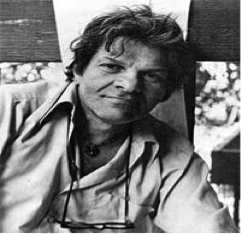 In the 1950s there arose a group of American writers who called themselves the Beat Generation. The Beat Generation epitomised the new hippie culture of sex, drugs and rejection of traditional standards. Jack Kerouac described Gregory Corso as “a tough young kid from the Lower East Side who rose like an angel over the rooftops and sang Italian song as sweet as Caruso and Sinatra, but with words…”
In the 1950s there arose a group of American writers who called themselves the Beat Generation. The Beat Generation epitomised the new hippie culture of sex, drugs and rejection of traditional standards. Jack Kerouac described Gregory Corso as “a tough young kid from the Lower East Side who rose like an angel over the rooftops and sang Italian song as sweet as Caruso and Sinatra, but with words…”
He was born as Nunzio Corso, March 26th 1930 in St Vincent’s Hospital, Little Italy. His mother Michelina was an Italian who emigrated to the US as a young girl. She met and married Sam Corso, another first generation Italian-American, when she was sixteen and gave birth to Gregory the same year.
Corso’s childhood and early life were blighted by abandonment and abuse. His mother left him, in his infancy, at the New York Foundling Home. If it was expected that his father would rescue him then that hope was cruelly dashed when his father placed Gregory in a foster home. It was only in much later life that Gregory learned of the full extent of his father’s cruelty towards his mother. He spent his youth in several different homes, eventually ending up living on the streets. Despite this he attended the local Catholic school and survived by running errands for shopkeepers in exchange for food. The tough times continued when he was sent to jail, the notorious Tombs jail in New York, for theft of a toaster at the age of thirteen. He had sold the toaster for money so he could go to see a film, The Song of Bernadette. This religious-themed movie, along with his Catholic education, manifested his life-long interest in the saints. His terrifying jail-time in the Tombs did not entreat him to mend his ways and he continued to be sent there twice more before his seventeenth birthday, after which another offence of theft saw him sent to an adult prison, New Jersey’s Clinton State Prison. Corso credited this place with giving him the means to become a poet. When he produced his second volume of poetry, Gasoline, he said:

While in Clinton Prison Corso proved himself to be an imaginative storyteller, concocting stories to burnish a tough guy reputation. This brought him to the attention of Mafia affiliated inmates who, thinking Corso himself may be ‘connected’ saved Corso from an attack in the prison showers. From now on he enjoyed the protection of his Mafia friends and in fact, started to enjoy his prison time, becoming an entertaining friend to the Mafiosi. He was able to use the library of books left behind by Lucky Luciano and he began writing poetry and studying the Classics.
In 1951, after release from prison, Corso met Allen Ginsburg in a bar who recognised Corso’s talent. Ginsberg was Corso’s introduction to the Beat circle, and became a life-long friend.
Corso’s first volume, The Vestal Lady on Brattle, was published in the Harvard Advocate in 1955. In 1958 he published a collection of poems which included one of his most notable ones, Marriage, a very long poem abstractly charting the constraints of polite society. It showed an enthusiasm for marriage at first but by the end rejected it as a concept and institution. Here are the opening lines:

Corso travelled around the world with Ginsberg and the other Beat writers before returning to New York in the 1960s. He married three times and produced four children in all, proving himself to be a better father than his own had been. In later years he became reconciled with his mother. He died from prostate cancer on January 17th 2001 and his ashes were interred at the foot of the grave of poet Percy Bysshe Shelley, as he’d wished.

